Contents
Summary
Happiness is powerful. It builds resources and increases positive thoughts that buffer against negativity. Evidence shows that we’ll be happier if we show:
- Good character
- Be kind
- Have transcendent beliefs
- Can bring meaning and purpose to our lives
But we must not neglect our basic and growth needs!
- Allah wants people and communities to be successful and happy.
- So Islam asks us to address all our psychological needs – with balance.
- And look after other people’s psychological wellness too.
- Show kindness every day and you will be happy – it’s proven!!
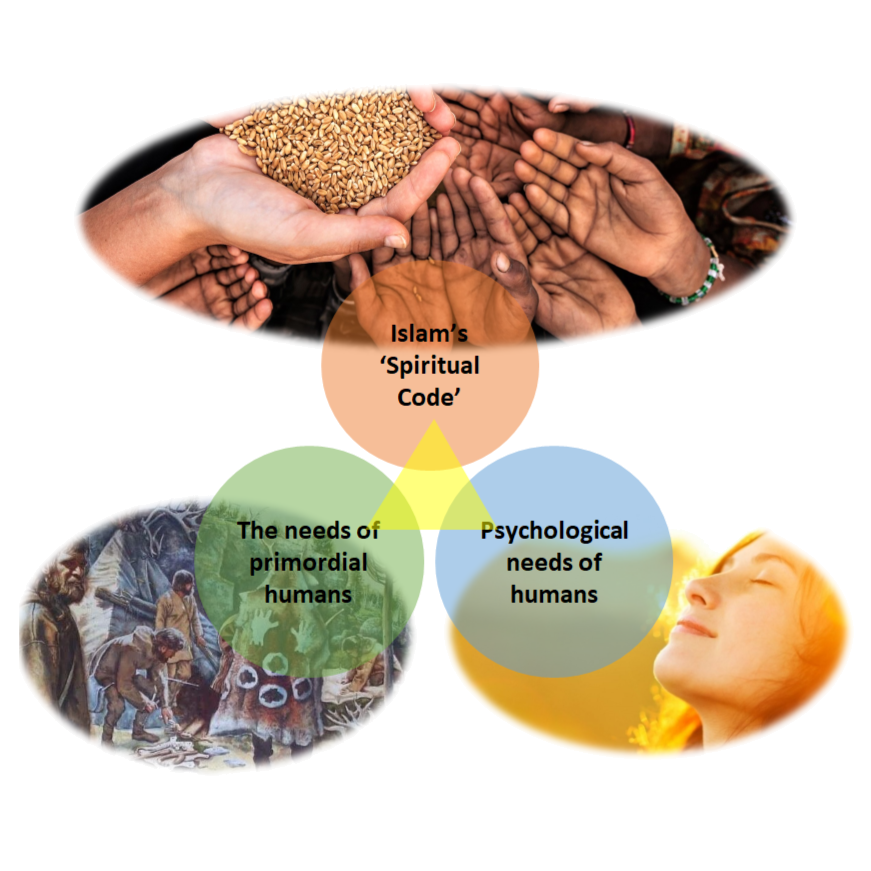
1. Benefits of Happiness
Research shows that happiness:
- Boosts your immune system
- Lowers heart rate and blood pressure
- Makes others happy… who make you even happier!
- Leads to career success
- Makes you less stressed
- Results in fewer infections
- Protects against other diseases and disabilities
As well as strong evidence of happiness:
- Broadening our thoughts and actions
- Facilitating optimal functioning
- Building resilience
- Fostering flourishing
- Undoing the effects of negative emotions
- Strengthening immunity – even against the common cold
(Cohen, Doyle, Turner, Alper, and Skoner (2003))
2. Ideas on the Nature of Happiness - Aristotle & Imam Ghazali
Aristotle (b. 384 BC)
There are many theories of happiness, spanning back throughout history. One is from Aristotle, who Muslim scholars used to call “The First Teacher”! The concept is that of hedonism VS eudaimonia. The idea is that hedonism is not true happiness, and that eudaimonia comes from doing what you’re inherently made to do – which is behaving with virtue (“arete”).
“Everywhere we see people seeking pleasure, wealth, and a good reputation. But while each of these has some value, none of them can occupy the place of the chief good for which humanity should aim.
–
The function of man is to live a certain kind of life, and this activity implies a rational principle, and the function of a good man is the good and noble performance of these, and if any action is well performed it is performed in accord with the appropriate virtue: if this is the case, then happiness turns out to be an activity of the soul…“
(Nicomachean Ethics, 1097a30-34)
Imam Ghazali (1058-1111) – The Alchemy of Happiness
Ghazali theorised many ingredients in th e alchemy of happiness. One vital one was existential self-knowledge:
e alchemy of happiness. One vital one was existential self-knowledge:
“He who knows himself, he knows his Lord.”
–
For example, knowing the answers to: who are you, where did you come from, where are you going, and what is your purpose here?
Secondly, Ghazali found an example in the prophets. They were the happiest people: the “treasuries of God” (where happiness is found) is in the “hearts of the prophets”.
Ghazali didn’t see happiness as having a perfect problem-free life. It’s not about what happens to you – the prophets went through many hardships but had the happiest of hearts!
Essentially, true happiness is in doing the right thing, living with purpose and living as who you choose to be.
3. Maslow's Hierarchy of Human Needs
For us to achieve happiness, our psychological needs (as well as other types) need to be met. Over time, many academics have categorised these. Many relate to community, love and kindness, with much of it overlapping with direct teachings in Islam (see the section ‘Does Islam prioritise wellness?’ and onwards).
Abraham Maslow (1908-1970) is one academic who categorised our needs. He is the father of ‘humanistic psychology’, which delves into the needs of human beings, and our seeking fulfilment and happiness. He theorised that when our human needs are not met, this causes some kind of psychological trauma.
This contrasts with other psychologists’ (like Freud), who theorised that our innate needs are to seek power and sex, gratifying ourselves by satisfying the ID. Gratifying these was seen to cause happiness, and suppressing them would cause psychological and psycho-sexual issues.
Maslow’s opinion of the above was that it was reductive to simplify human needs to these, and so “perhaps humans have been sold short”. His hierarchy therefore shows a range of different needs that are all important:
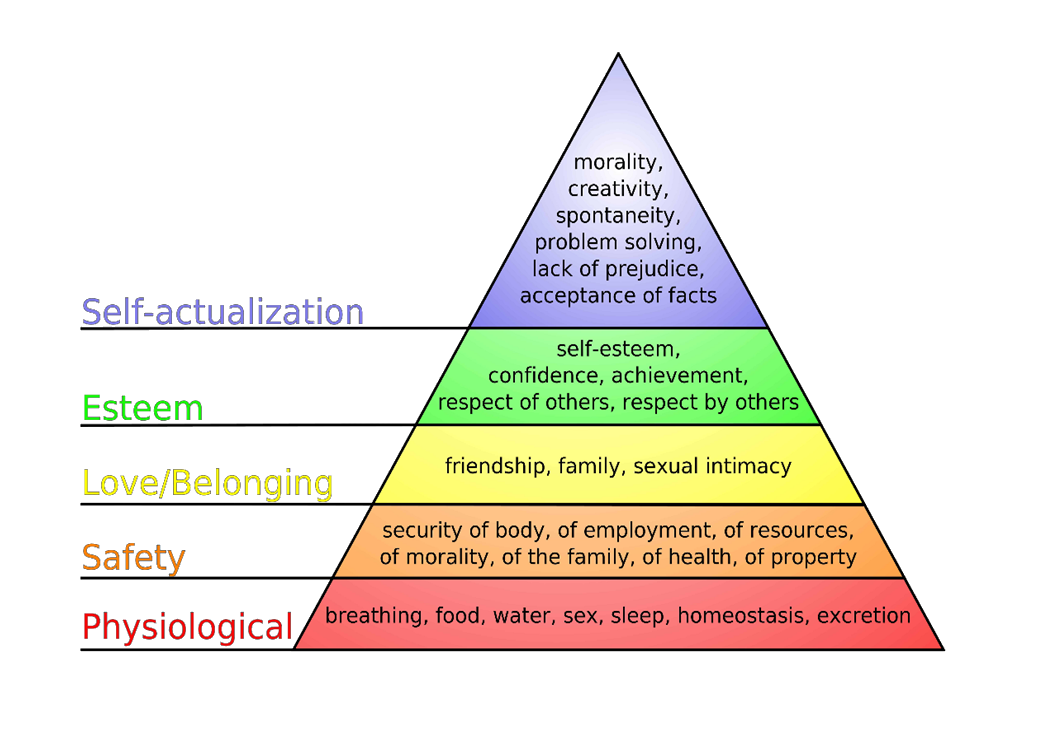
Maslow studied amazing people rather than troubled people, from a perspective of positive psychology. For example, in 1938, he lived with the Blackfoot Indians of Alberta, Canada.
“He was inspired and impressed by their lack of ‘crime, violence, jealousy, and greed… along with their high levels of emotional security, firm yet caring child-rearing practices, community feeling, egalitarianism, and generous spirit.'”
(Kaufman, Scott B., Transcend, p. 4)
Furthermore, giving wealth away was what brought status in the tribe. It’s clear from Maslow’s visit that he learned quite a bit about the First Nations perspective, including the importance of community, gratitude for what one has, and giving back to future generations.
4. Learned Optimism - Martin Seligman (b. 1942)
Seligman was more focused on happiness and wellness specifically, rather than Maslow with ‘needs’. He wanted to study well people rather than ‘pathology’, which was the study of the ill mind and was rife in the field of psychology.
At first, he worked on the ‘learned helplessness’ theory on depression, then changed it up and published a book theorising about ‘learned optimism’ (1990). He was therefore a lead psychologist in the study of happiness, and a pioneer in Positive Psychology. He wanted to learn from happy, well people, and also emphasised the importance of good character as “character strengths”.
It’s important for us to remember to see what makes happy people happy, rather than focusing on unhappy people and trying to avoid whatever we think is making them unhappy.
5. Understanding Emotions: The Upward Spiral
There is lots of evidence for positive affect/emotions building:
- Intellectual resources (problem solving, learning capacity, resourcefulness and openness to learning)
- Physical resources (cardiovascular health, optimal immune function, healthy lifestyle)
- Social resources (interacting, playing, building trust, pro-social actions)
- Psychological resources (coping, resilience, goal pursuit).
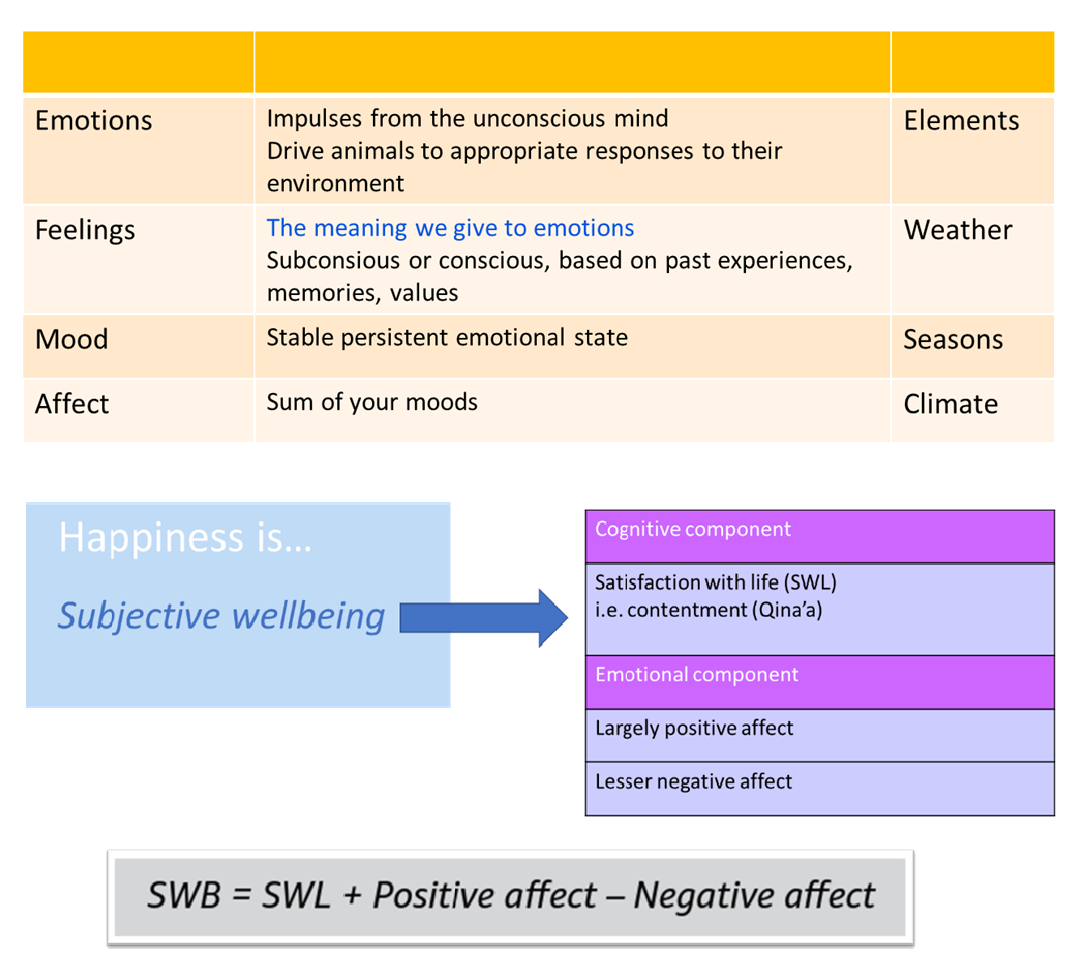
The Upward Spiral!
Upward spirals are only caused by the positive emotions from the above equation, not happiness.
Positive emotions build resources, which changes you, making you more resourceful/capable. It causes an upward spiral that is the opposite of the downward spiral you get with depression (that becomes a chicken and egg situation).
“As people accumulate resources, cycles of “upward spirals” occur, whereby the newly accumulated resources and capacities induce more positive emotions. These continue to broaden and build further resources, thereby producing perpetual upward cycles of transformation in our emotional states and our resources.”
Hart, Rona. Positive Psychology (The Basics) (p. 77)
We should always remember that negative emotions tend to have a strong effect, and may take many positive ones to balance out:
“…good may prevail over bad by superior force of numbers: Many good events can overcome the psychological effects of a single bad one.”
Hart, Rona. Positive Psychology (The Basics) (pp. 78-79)

Emotional Intelligence Also Leads to Happiness!
The Four Elements of Emotional Intelligence

6. Paul Wong's Four Pursuits of Happiness - Positive Psychology
While Wong’s theory of needs may seem complex, put simply it splits our pursuits of happiness into physical/practical needs, emotional needs, and spiritual needs/meaning in life. We need all of these for our happiness and satisfaction with life.
From the top down, we have:
Chaironic Happiness: Spiritual higher purpose, religion, existential understanding, etc.
Eudaimonic Happiness: Caring, kindness, purpose beyond self.
Prudential Happiness: Personal growth, self-improvement.
Hedonic Happiness: Basic and physical needs, desires, etc.

The Full Diagram: Four Pursuits of Happiness
Below is the full diagram explaining each of the Four Pursuits of Happiness, breaking them down into their parts! Courtesy of ISB mentor Rizwan Syed’s reading and study of Wong.
You will likely seek happiness from multiple happiness groups from the diagram – maybe some are more prudential (you’re happy when you look good, when you have a laugh with friends, or when you master a new skill at work or get really good at a hobby). Maybe you have some chaironic happiness mixed in with the peace of mind and clarity of purpose that your religion gives you. And maybe you enjoy a bit of the hedonistic pleasures of a luxurious meal out, but also the basic need for the comfort and safety of being respected and treated well by your family.
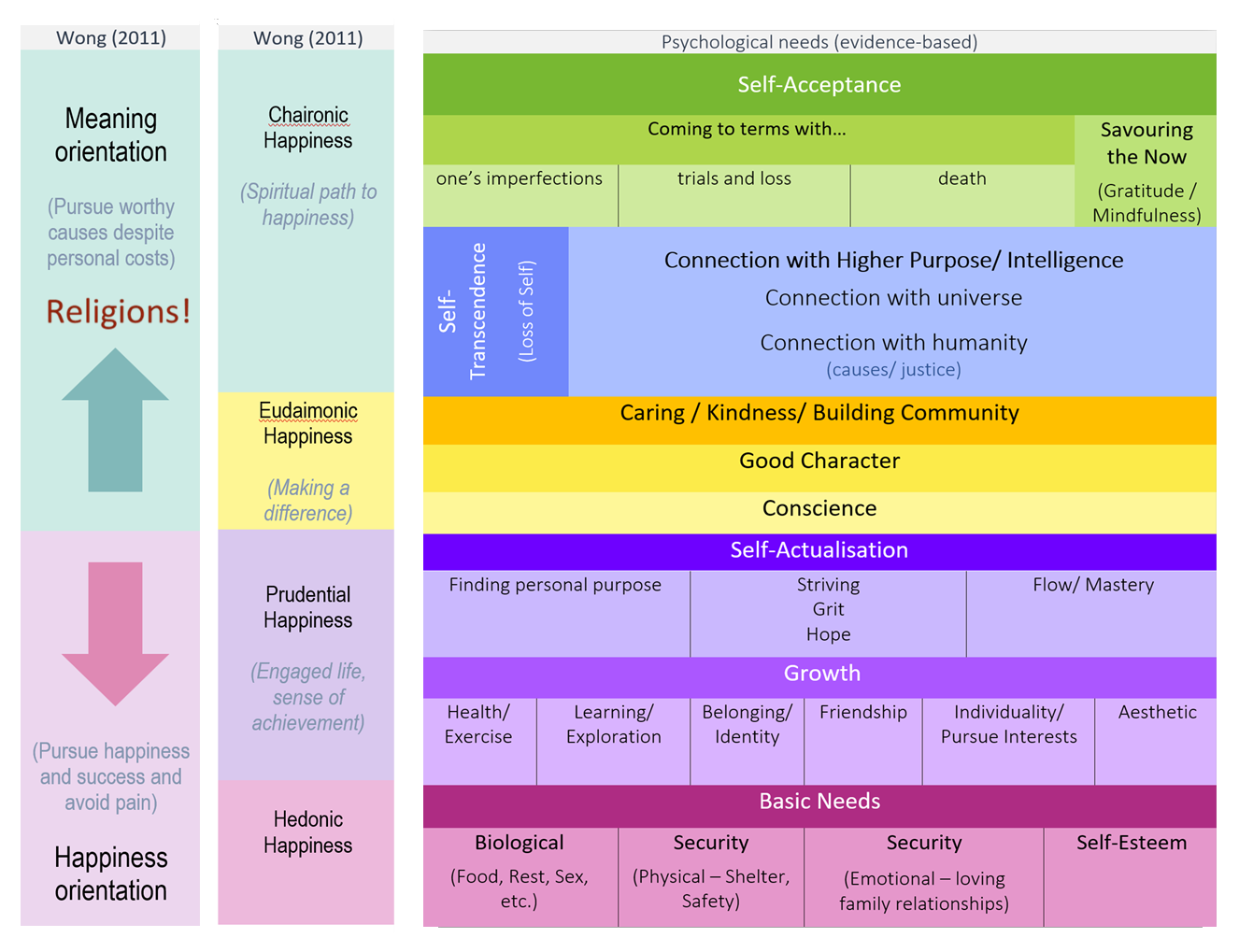
The Meaning Orientation
Wong found that people have two basic overall orientations (see the diagram above with two ‘arrow’ directions): one around meaning in life and higher purpose, which tends to coincide with religion, and one of ‘prudential’ and ‘hedonic’ happiness, which encompasses personal purpose, identity, pleasure and basic needs. Religious people tend to be happier and more satisfied with life than others. They are generally more resilient to setbacks and tragedy – the more practicing they are, the more optimistic they will be. Meaning is perhaps a different kind of happiness; that even though you may not be necessarily be happy day to day, you feel fulfilled and content with life.
“Meaning in life has been correlated with happiness, wellbeing, vitality and high morale, sense of control, autonomy, environmental mastery, positive perceptions of the world, religious affiliation and spirituality.
–
Meaning and its component purpose are strongly linked to goal pursuit, motivation and engagement with goals, the attainment of valued life-goals, as well as with self-actualisation and self-transcendence.”
(Hart, Positive Psychology: The Basics, p. 138)
7. Does Islam prioritise wellness? Yes!
Wellness is a big priority in Islam. The religion is not about making life difficult for us – it’s the opposite! The path is to be trodden because it is for our good, including in this world.
Does Islam test faith through adherence to harsh, irrational laws? On the contrary, Allah wants us to be well and happy, and gives us Islam as a path towards this:
“Allah desires for you ease; He desires not hardship for you.”
(Qur’an, 2:185)
“He has chosen you and has not placed upon you any difficulty in the religion.”
(Qur’an, 4:28)
Islam is a favour for us, not a burden of harsh irrational laws:
“This day I have perfected your religion for you, and completed My favour upon you, and chosen Islam for you as religion.”
(Qur’an, 5:3)
In fact, Allah wants good for us, even if we don’t realise it:
“Perhaps you dislike something which is good for you and like something which is bad for you. God knows and you do not know.”
(Qur’an, 2:216)
8. Each Psychological Need and How Islam Encourages It

We need them fulfilled before the ‘higher fulfilment’.
Therefore, the objective is to ensure that all humans have their basic needs met; there is NO point expecting them to ascend to spiritual heights, convert etc, when their basic needs aren’t met.
What does Islam say?
Abu Sa’id Al-Khudry (RA) reports that the Messenger (PBUH) once made the following du’a:
“ ‘O Allah I seek refuge in You from disbelief and poverty.’
Someone enquired: ‘Are these two equal?’
The Prophet (SAWS) replied: ‘Yes.’ ”
(Sahih Ibn Hibban, Hadith: 1026 – Al-Ihsan)
This hadith emphasises how you cannot simply make someone happy by giving them belief – their basic needs must also be met too.
Charity in Islam, which meets the basic needs of others, is highly important in the faith, and emphasised repeatedly.
Self-esteem is also a basic need. In Islam, the Maqasid (purposes of the Shariah) all fulfil the essential human needs. The Maqasid prioritises the preservation of:
- Faith
- Life
- Intellect
- Property
- Family
- Dignity (i.e. self esteem!) – your job as a Muslim is to help others’ self-esteem, with kindness, smiling, and appreciation.
Teachings of the Prophet:
“Speak good or keep silent”
“When one of you loves his brother, let him know.”
“He who is not grateful to people, is not grateful to Allah”

These are embellishments after basic needs. The dopamine pathway is there to help you learn and explore, by making it fun – it’s related to motivation, excitement, and curiosity. Unfortunately, this pathway is abused by social media algorithms, video games etc, giving us too-easy dopamine hits.
Belonging!
Interestingly, Geneviève L. Lavigne and colleagues (‘The Fundamental Need to Belong’, 2011) found two clear orientations that relate to the need for belonging:
- A growth orientation, which is driven by curiosity, a sincere interest in learning about others and yourself.
- And a deficit-reduction orientation, which is driven by an overly high need to feel accepted and to fill a deep void in one’s life.
Kaufman, Scott Barry. ‘Transcend’ (p. 94). Penguin Publishing Group. Kindle Edition.
Consider: are you friends with someone mainly because you’re worried about being alone without friends? Or because it feels safe not being on the outside (even when you may be faking who you are to be accepted)? Or are you genuinely interested in them as a person, the dynamic you have, and what you learn from each other?
In terms of our ‘growth’ needs, Islamic teachings agree as well:
- Health: “Your body has a right over you”
- Learning: “Seeking knowledge is an obligation on every Muslim”
- Belonging: “The believers are but one brotherhood”
- Friendship: “Allah Almighty said: My love is a right upon those who befriend each other for my sake”
- Aesthetic: “God is beautiful and loves beauty”

What is meaning in life?
“Meaning in life is defined as the degree to which an individual experiences his or her life as making sense, being guided and driven by worthy goals, and mattering in the world.”
(King, Heintzelman & Ward, 2016)
To achieve this happiness, it’s about finding your purpose, striving for it, achieving it and then mastering it – and thus having a sense of calm and fulfilment!
How do we self-actualise?
“To discover our meaning in life, some self-reflection and self-awareness are required to make sense of our lives and discover what gives our life meaning, define our purpose through setting life goals and contribute to projects where we can make a difference.”
Hart, Rona. Positive Psychology (The Basics) (p. 139). Taylor and Francis. Kindle Edition.
What are the benefits of finding meaning in life?
Meaning in life has been correlated with happiness, wellbeing, vitality and high morale, sense of control, autonomy, environmental mastery, positive perceptions of the world, religious affiliation and spirituality.
Meaning and its component purpose are strongly linked to goal pursuit, motivation and engagement with goals, the attainment of valued life-goals, as well as with self-actualisation and self-transcendence…
“On the deficiency side, the lack of meaning in life is correlated with negative affect, rumination, adverse life events, hassles and grief, stress, hostility, sexual frustration and several mental illness conditions (depression, suicidal ideation, anxiety, substance abuse and posttraumatic stress disorder (PTSD)). There is however evidence that therapy can benefit these populations (Steger, 2017).”
Hart, Rona. Positive Psychology (The Basics) (p. 138). Taylor and Francis. Kindle Edition.
But how do I discover my meaning in life?!
We have to do some self-reflection and have self-awareness to make sense of our lives, and realise what gives it meaning. Try setting life goals for yourself and contribute to projects that feel important to you, where you can make a difference. Meaning doesn’t just make you happier, but helps you flourish, by ‘doing well as well as doing good’ (Rona, Positive Psychology, p. 139)
What does Islam say?
Hadith and Qur’anic teachings on self-actualisation:
“Strive in the way of your Lord, as you ought to strive”
“Indeed God is with the patiently perseverant”
“Indeed Allah has prescribed proficiency in all matters”
“You are the best of peoples evolved for the benefit of mankind”

Peterson and Seligman (2004) embarked on a 3-year research project, involving 55 scientists from around the globe. The researchers consulted the world’s classic religions and philosophical texts, looking for traits and qualities that appeared to have been valued throughout history and across different cultures. The result of this extensive work was the creation of a universal classification of positive character traits, known as the VIA (Values in Action) Character Strengths and Virtues.
Hart, Rona. Positive Psychology (The Basics) (pp. 140-141). Taylor and Francis. Kindle Edition.
“Led by Katherine Dahlsgaard, we read Aristotle and Plato, Aquinas and Augustine, the Old Testament and the Talmud, Confucius, Buddha, Lao-Tze, Bushido (the Samurai Code, the Koran, Benjamin Franklin, and the Upanishads – some two hundred virtue catalogues in all. To our surprise, almost every single one of these traditions flung across three thousand years and the entire face of the earth endorsed six virtues…”
(Seligman, Authentic Happiness)
These six virtues were coined through analysing the voices of humanity throughout history:
-
Wisdom and knowledge
-
Courage
-
Love and humanity
-
Justice
-
Temperance (moderation, humility, self-control, etc)
-
Spirituality and transcendence
Everyone has character strengths. Identifying them and working on character has been shown to have many benefits, including:
- Positive & constructive relationships
- Resilience
- Lower levels of depression
- Social Skills
- Self-esteem
- Sense of meaning!
- Insight & Self-reflection
- Increased happiness or satisfaction with life!
(Hart, Rona. Positive Psychology (The Basics), Taylor and Francis. Kindle Edition)
Think about the needs of our prehistoric ancestors…
Over 1000s of years, natural selection only allowed the propagation of people whose mindset was suited to primordial success.
You become your psychology.
Whatever you put your mind to, you are set to achieve…
So, our minds have adapted over 1000s of years to fit the needs of primordial humans.

What does self-transcendence mean?
- Seeing beyond yourself, to the needs of humanity.
- Loss of self – seeing life & the world as bigger than you. Part of something bigger: the universe, all humanity, existence of a higher power.
- E.g. selflessness for a cause
Self-transcendence dissolves concerns about yourself. Your life is less important, so your own issues pale in comparison to the bigger picture. It is a greater understanding and meaning beyond yourself.
Suffering: when you have a purpose, any suffering has meaning as it is seen as directing/leading towards the purpose.

What is self-acceptance?
- Coming to terms with the frailty of reality and its ups and downs, and death, as a part of life – and that you can weather those storms.
- Seeing bigger things than your mortal existence, and being okay with that.
Mindfulness…
- Mindfulness leads to shukr/gratitude.
- Is doing everything with presence, like the Prophet taught. Appreciating things in the moment, having gratitude for them, savouring.
9. Islam's Spiritual Code
How important is good character in Islam?
See the Spiritual Code – which is all from the Qur’an!
It is emphasised by the Prophet, and described as ‘his sunnah’:
“You are indeed set upon an exalted character”
(Qur’an’s description of the Prophet, 68:4)
The spiritual code is summarised below. It encompasses Islamic worship as well as ethical principles of character and how to treat others. For example, the ‘Commandments’ protect people’s basic needs and rights. The ‘Character’ teachings align with other religions’ universal moral virtues, and are all proven to lead to happiness. The ‘Service’ teachings promote community cohesion and empathy for others.
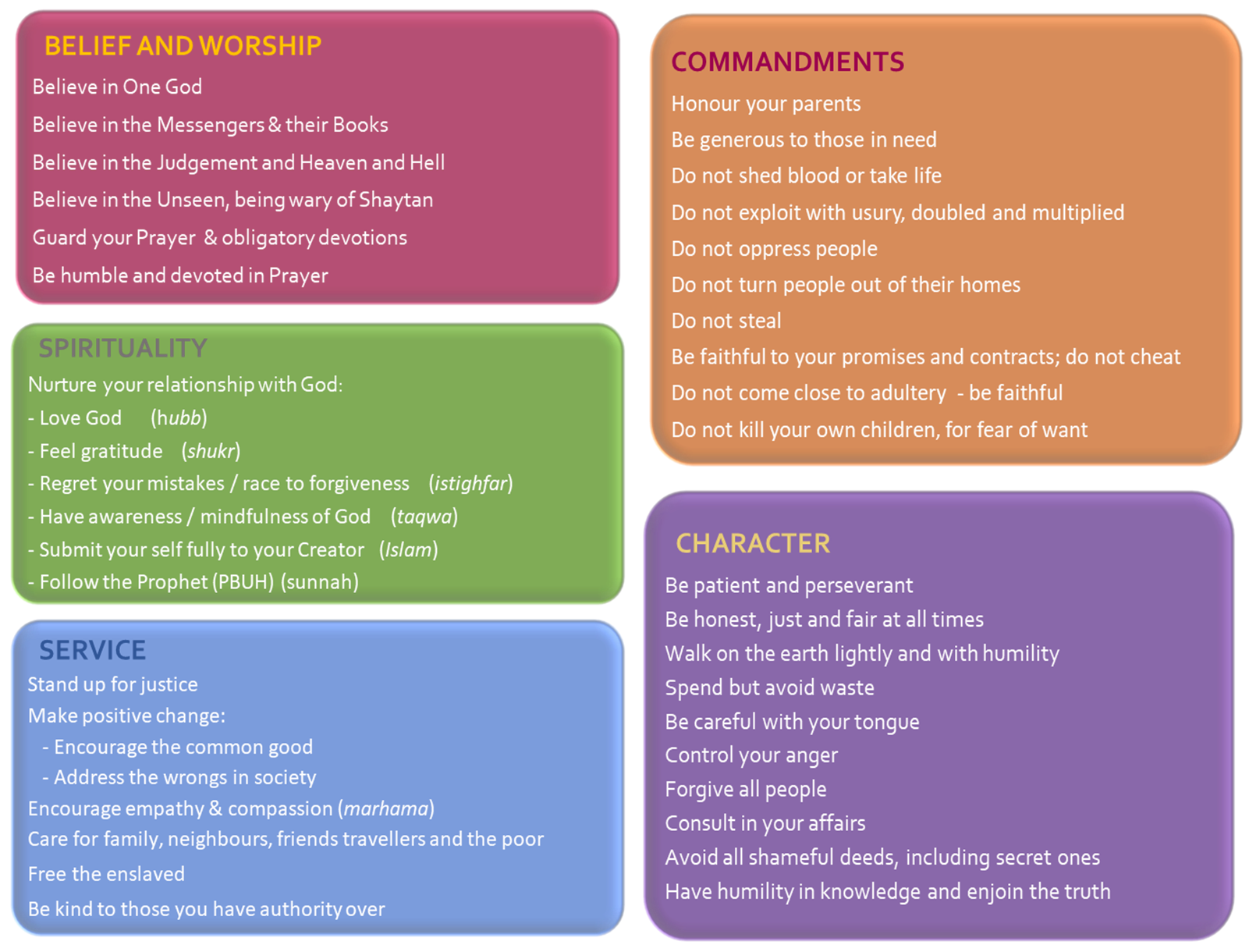
Belief & Worship = Self-transcendence, self-acceptance, and gratitude
Commandments = Protects people’s Basic Needs
Character = Aligns with other religions’ character teachings, and all proven to lead to happiness, community cohesion, etc.
Service = Prosocial behaviour, i.e. helping others, feeling empathy & concern for the rights, feelings and welfare of others.
Social support can have a powerful impact on many aspects of wellness, e.g. reducing risk of loneliness, alcohol use, and depression, as well as reducing stress and improving your mood. (See https://www.verywellmind.com/what-is-prosocial-behavior-2795479 for more information!)
For more on the Spiritual Code, read this powerpoint, or our more in-depth article here!
References & Further Reading
References and Further Reading
Bregman, Rutger (2019) Humankind: A Hopeful History.
Cave of Forgotten Dreams (2010).
Hart, Rona. Positive Psychology (The Basics), London: Taylor and Francis.
One God, Many Names:
www.theoasisinitiative.org/one-god-many-names
The New York Times (2012) ‘Ancient Bones That Tell a Story of Compassion’.
https://www.nytimes.com/2012/12/18/science/ancient-bones-that-tell-a-story-of-compassion.html
Reich, David (2018) Who We Are and How We Got Here: Ancient DNA and the new science of the human past, Oxford: Oxford University Press.
See him on Youtube at: www.youtube.com/watch?v=3-vHByC14bc
Wong, Paul, Positive Psychology 2.0: Towards a Balanced Interactive Model of the Good Life.
www.drpaulwong.com/positive-psychology-2-0-towards-a-balanced-interactive-model-of-the-good-life/
